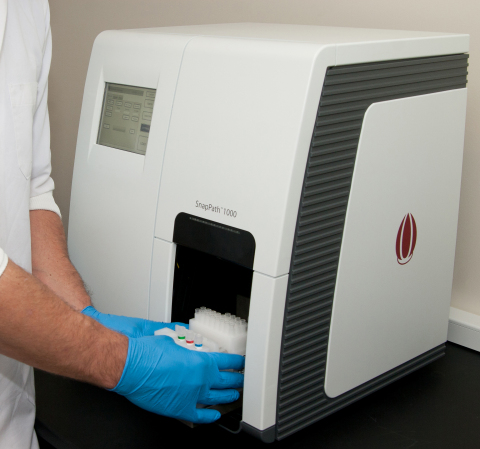BioMarker Strategies, LLC, today announced that the National Cancer Institute (NCI) has awarded the Company a Phase II Small Business Innovation Research (SBIR) contract to continue development of its PathMAP® Immunotherapy test to predict clinical response to PD-1/PD-L1 targeted immune checkpoint inhibitors,
This press release features multimedia. View the full release here: https://www.businesswire.com/news/home/20200107005240/en/

The SnapPath® Cancer Diagnostics System, developed and patented by BioMarker Strategies, is the only diagnostics system that can generate purified populations of live solid tumor cells from live, unfixed samples in an automated and standardized manner. SnapPath preserves the molecular integrity of these living cells for ex vivo exposure to immunotherapies, targeted therapies and combinations. This enables generation of PathMAP® Functional Signaling Profiles, which are highly predictive of individual tumor response to these therapies and combinations, because these tests are based on the dynamic, predictive signaling information available only from live cells. (Photo: Business Wire)
The Phase II contract follows a Phase I contract that supported development of initial proof-of-concept data for PathMAP Immunotherapy as a pathway-based test to identify patients who could otherwise be excluded from treatment with these very important therapies, because currently available tests show them as negative for the biomarkers currently used to identify patients who might benefit.
“Durable responses have been observed in patients with non-small cell lung cancer who have received treatment with immune checkpoint inhibitors, which enable the immune system to kill tumors,” said Jerry Parrott, President and CEO of BioMarker Strategies. “However, the reality is that the objective response rate to single-agent immunotherapy is low, at 10-30%. And, the emergence of resistance is observed in patients who initially respond, just as is observed with chemotherapies. This Phase II SBIR contract from NCI will enable us to continue development of our PathMAP Immunotherapy test to predict individual patient response to checkpoint inhibitors, both alone and in combination with chemotherapies.”
This project is funded in whole or in part with Federal funds from the National Cancer Institute, National Institutes of Health, Department of Health and Human Services, under Contract No. 75N91019C00022.
Lung cancer is the leading cause of cancer death in the United States, with an estimated 154,000 deaths in 2018. NSCLC is responsible for more than 80% of these deaths.
About BioMarker Strategies
BioMarker Strategies has developed SnapPath®, the only cancer diagnostics system that automates and standardizes functional ex vivo profiling of live solid tumor cells from fresh biopsies or other fresh, unfixed samples such as xenografts or tumorgrafts. SnapPath® can help guide cancer drug development and treatment selection. SnapPath® is unique in automating and standardizing functional profiling of live solid tumor cells from fresh, unfixed tissue samples – and enables the generation of PathMAP® Functional Signaling Profiles.
PathMAP® Functional Signaling Profiles represent a new class of biomarker tests, which are based on the dynamic and predictive signaling information available only from live cells. They are highly predictive of individual tumor response to treatment and are useful in identifying and understanding mechanisms of acquired resistance. BioMarker Strategies also believes that PathMAP® Functional Signaling Profiles will prove highly predictive of individual patient response to immunotherapies and combinations of immunotherapies with targeted therapies.
The capabilities of SnapPath® and the Functional Signaling Profiles it enables are available for Research Use in preclinical studies in tumorgraft and other model systems, and in early clinical studies to assess pharmacodynamic changes in the solid tumors of individual patients.
Patents covering the SnapPath® Cancer Diagnostics System have been granted to date in the United States, Europe, Australia, Canada, Hong Kong, Japan and Korea, and are pending elsewhere. Patents covering the PathMAP® Functional Signaling Profile technology have been granted to date in the United States, Europe, Australia, Canada China, Japan, Korea and Singapore, and are pending elsewhere. Provisional patent applications were filed in October 2019 to protect two entirely new families of inventions emerging from BioMarker Strategies’ immune-oncology research over the past year and a half. For more information about BioMarker Strategies, please visit the company website at www.biomarkerstrategies.com.
Forward-Looking Statements
The information in this press release includes our projections and other forward-looking statements regarding future events. In some cases, forward-looking statements may be identified by terminology such as “may,” “will,” “should,” “expects,” “intends,” “plans,” “anticipates,” “believes,” “projects,” “estimates,” “predicts,” “potential,” “continue”, etc. These statements are not guarantees of future performance or achievement and involve certain risks and uncertainties, which are difficult to predict. Therefore, actual future results and trends may differ materially from what is projected here.
View source version on businesswire.com: https://www.businesswire.com/news/home/20200107005240/en/
Source: BioMarker Strategies, LLC
Smart Multimedia Gallery
The SnapPath® Cancer Diagnostics System, developed and patented by BioMarker Strategies, is the only diagnostics system that can generate purified populations of live solid tumor cells from live, unfixed samples in an automated and standardized manner. SnapPath preserves the molecular integrity of these living cells for ex vivo exposure to immunotherapies, targeted therapies and combinations. This enables generation of PathMAP® Functional Signaling Profiles, which are highly predictive of individual tumor response to these therapies and combinations, because these tests are based on the dynamic, predictive signaling information available only from live cells. (Photo: Business Wire)







